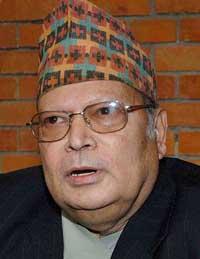
- Ideological Overture To The Nepali Maoists
- Sought eDialogue with Dr. Baburam Bhattarai
- Democrats, Imagine The Worst From Monarchists/Maoists
From Encyclopedia Britannica Online: " ...... system of political and economic organization in which property is owned by the state or community and all citizens share in the common wealth, more or less according to their need ..... Like the Soviet Union, Communist China also underwent fundamental changes in the 20th century. Following the economic failures of the Cultural Revolution (1966–76), it adopted a modernization plan designed to attract foreign investment; to improve agriculture, industry, science and technology, and defense; to allow greater individual freedom of choice; and to reduce the influence of political dogmatism in nonpolitical spheres of life. The economy, especially in South China, grew at a record pace from the late 1980s as the government introduced extensive free-market reforms, which were expanded further at a Communist Party plenum in November 1993. In March 1999 the People's Congress adopted two constitutional amendments, one affirming that private enterprise is "an important component of the socialist economy," the other stating that the country "should implement the principle of rule by law." ....."
To: Prachanda and Baburam.
I have tried hard in my own small way to build a bridge between the Maoists and the democrats. And you have come out in public statements since 2/1 stating support for a "multi-party democratic republican" framework. But I feel you still have some work to do to build a bridge of trust with the democrats. In short, I feel like you need to confront your ideology itself.
I have not read Dr. Bhattarai's book that has been widely praised as a major scholarly work, the one that is a Marxist analysis of Nepal's agrarian situation, calling for major land reforms. I know from personal experience the need for land reforms in Nepal has been stark. But land reforms, no matter how "revolutionary," might be a little behind times. The real social transformation might lie in universal education and health, perhaps paid for by an abolition of the army.
Violence is what is holding you back. You need to cooperate with those international human rights activists who want you and the army to sign the Human Rights Accord, to be monitored by those international experts. This is not asking you to disarm or be disbarred. If you all can not come around to signing this Accord, there is little ground possible between you and us democrats. And if you can not show respect to these human rights activists, who are not affiliated to any state, what are the chances you will show respect to the UN, whose mediation you have sought in the past? Mind you, the respect you showed to the UN in word by seeking their role in mediation did you some good, showed you were capable of some reason.
If you come out for the Accord, and the army and the monarchists do not, then you win a symbolic first step victory. That builds some trust between you and the democrats.
Human Rights are independent of political ideology. They are of universal value, and should be universally implemented. No political organization anywhere on the planet that does not abide by the doctrine of human rights is legitimate. My number one grudge with the king is not that he has executive powers, but that he has just thrown the country into a major human rights quagmire. That is unforgivable.
So, come around to it. Cooperate and sign the Human Rights Accord that you were already inching towards before 2/1. Or at least make an announcement that you are ready if the Monarchists are ready.
Second, let's work out a Common Minimum Program. My push would be for a two word platform: Democratic Republic. But some parties in the democratic camp might still not have gotten over their love affair with the monarchy, and they have every right to their opinion, and the Monarchists certainly will not go for it.
So we do the next best thing. We go for a Common Minimum Program of a Constituent Assembly. That can not come in the form of a unilateral statement, but rather in bilateral and multilateral dialogue with all the democratic forces, in exile as well as in the country.
After you have signed the Human Rights Accord, or have unilaterally expressed support for it, and have worked toward a common minimum program of a Constituent Assembly, if the junta has not budged by then, the internatioal pressure and the pressure from the people will be too great. The regime will collapse.
Let's move towards that.
I read your statement of March 13 with great interest, and found many hopeful possibilities therein: " ..... aspiration of achieving full democracy ...... artless drama of repeating 1960 ..... democratic revolution, the overdue since 1950 ..... establishing a broad front of all the political parties, civil societies and intelligentsia ..... a concrete understanding among the political parties to unite the broad masses ..... our party would like to clarify its preparedness for the sacrifice necessary from our part through this statement ..... to help conduct political activities in any part of the country without any hindrance, our party thinks necessary to go ahead by carrying out criticism and self-criticism among the political parties and maintaining unity in a new basis ..... we would like to request humbly all the political parties in and outside of the country not to have any doubt in our party’s declared policy of Constituent Assembly and multiparty democratic republic ..... "
Let's move from statements to bilateral and multilateral dialogues. And I hope you come out taking as clear a stand on human rights as you have on the question of a multiparty democratic republic.
One way for you to show you really mean what you say about other parties is to show that any worker from any party is perfectly safe doing their peaceful agitation work in any of the 4000 villages in the country. That would be an important confidence building measure between the Maoists and the democrats.
Other References
- Misconceptions, Confusions, and Conflicts Concerning Socialism, Communism, and Capitalism Washington State UniversityStudent resource offering aricles on the subject provided by the Washington State University. ....... Previous generations of Americans often had misconceptions about Communism, but the current generation usually has no conception of it at all.
- The Principles of Communism
- en.wikipedia.org/wiki/Communism
- http://en.wikipedia.org/wiki/Maoism
- Museum of Communism
- For Communism - John Gray Web Site
- Informal Communist Discussion
- The Electronic Passport to Russia and Communism
- netcommie_homepage
- Victims of Communism Memorial Foundation: Honor the Victims of ...
- www.communism.4all.cc/
- Communism's True Believers
- Inside George Orwell
- http://www.marxists.org/
- anti-communism: Information From Answers.com
- Mikhail Gorbachev: Definition and Much More From Answers.com
- Clintons Are Communist Lackies
- Anti-communism
- Maoism - Hutchinson encyclopedia article about Maoism
- Marxism-Leninism-Maoism
- Discovering China: The Cultural Revolution
- Long Live Marxism-Leninism-Maoism!
- Maoism: Definition and Much More From Answers.com
- Maoism. The American Heritage® Dictionary of the English Language ...







